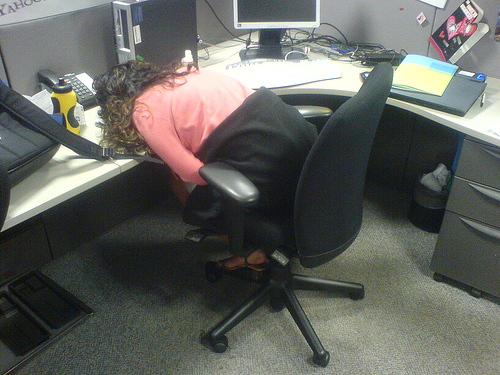*From the dusty archives…
A little over a week ago, I was starting to get sick. With springtime comes allergies so, like most people, I attributed my early symptoms to that. By day two though, I knew I really had something brewing. My main signal was sitting at my desk at work and suddenly feeling like I could fall asleep. I felt like George from Seinfeld when he decided he needed a nap at work and created a spot under his desk where he could sleep. I contemplated asking someone to come pick me up and drive me home, but instead, I drank a Coke and felt energized enough to drive myself.
Looking back, I know that day at work was not my most productive. I was trying my best to stay completely focused but the illness and drowsiness impacted my ability to stay focused and accomplish all I needed to do. Now, we all know that this happens to everyone. We get sick. What I am thinking about today is how many people who have long-term sleep issues come to work drowsy every day? What impact does that have on their productivity? Are they in positions that put others at risk? 
In a recent article highlighting the National Sleep Foundation’s 2012 Sleep In America poll, “about one-fourth of train operators (26%) and pilots (23%) admit that sleepiness has affected their job performance at least once a week, compared to about one in six non-transportation workers (17%).
Perhaps more disturbingly, a significant number say that sleepiness has caused safety problems on the job. One in five pilots (20%) admit that they have made a serious error and one in six train operators (18%) and truck drivers (14%) say that they have had a “near miss” due to sleepiness. Sleepiness has also played a role in car accidents commuting to and from work. Pilots and train operators are significantly more likely than non-transportation workers (6% each, compared to 1%) to say that they have been involved in a car accident due to sleepiness while commuting.”
Statistics like these are somewhat jarring but honestly, not completely surprising. While many of us do not have transportation related jobs, drowsiness can still have a significant negative impact on work productivity and our results.
As a leader, have you noticed that drowsiness has had an impact on your performance or the performance of your team? What signs have you seen that drowsy workers in a corporate setting are impacting productivity? Share in the comments.


One Comment
I must say im most productive when working alone at night at home. My work as a fundraiser and business development manager means i have to write alot of proposals. No matter how well I plan my day work, there is always that proposal or tender/bid document whose deadline is the next day and that means writing it to the wee hours of the morning.
This i have done on numerous occasions. However I always find that I am least productive the following day. Infact, i can hardly stay awake and end up going home early to pay my sleep debt.
I can say that having sleep deprivation will definitely affect your output at work and until you have slept off the fatigue, you are no good to anyone.
Robert K